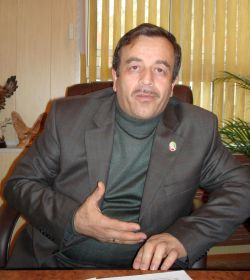The art of mimicry By Usam Baysayev, special to Prague Watchdog
Oslo, Norway
It is often interesting to compare the instincts and habits of animals with the behaviour of human beings. Mimicry, for example – the ability to adapt to one’s environment. Were it not for the chameleon’s ability to change colour according to where it happens to be at any particular moment – on a branch, on the ground or wherever, we would probably know it only in fossilized form.
Though the step from chameleon to man is a long one, man has achieved some success in mimicry. Take politicians, for example. They always say what ordinary people expect them to say. But they usually act on the basis of personal preference, and often of personal advantage. In Chechnya, too, there are now many skilled practitioners in the art of deception.
A few years ago the republic acquired its own human rights Ombudsman. Before he arrived, there was only the so-called “Special Representation of the President of Russia for Ensuring the Rights and Freedoms of the Individual and Citizen”. Despite its long and impressive title, this agency proved itself unable to help the victims of the conflict. It was headed first by Vladimir Kalamanov and then by Abdul-Khakim Sultygov, and they were mostly worried about the image of the Russian military. They often travelled to Europe and protected the interests of the Russian state by describing the horrors wrought by terrorists. Back then, the representation’s employees gathered statements solely from victims of the actions of Russian federal troops. No one was ever turned away. On the contrary, the victims were assured that they would definitely receive help, but that they would have to wait for a while. Rejoicing in these promises, people went back to their homes. Time went by, and they returned for the results. But once again they were merely told something and sent away. And so it went on, usually several times. Among ourselves, we called this organization the “sponge". It squeezed people's last hopes for justice and the energy they needed to obtain it, draining them like a sponge.
That is why initially I did not have any illusions about the institution that was created to replace it – the office of the Chechen human rights Ombudsman. But there was a hope: the hope that new people would arrive who had no direct connection with the crimes of the early years of the war and who would want to improve the situation in the republic. And indeed, the first statements by the new body were sometimes even harsher than those of our Memorial Human Rights Centre, and they inspired optimism. Some of those statements are etched in my memory. For example, the one about seven thousand Chechen citizens having disappeared without trace. Our figure was lower – three thousand, and was based on the information from victims’ relatives that was available to us. Our reports only hinted in the gentlest of terms that the number of victims must be two or even three times as much. Or the statement by the human rights Ombudsman about Chechen women in prison. We never dreamed that a representative of the federal government (the current Chechen government is an integral part of Russia's power vertical) would ever show a concern for their fate. And the new agency’s reaction to the early release of Colonel Yuri Budanov almost completely disarmed us. I can’t speak for my colleagues, but at the time I even thought we ought to co-operate with the Ombudsman and his staff.
They’re also Chechens, I thought back then, and they care about the fate of their compatriots, too. And so we have something in common, something that can’t fail to bind us together in spite of wars, religious chaos, divisions and biases along political lines. It doesn’t matter who you are, I said, trying desperately – it doesn’t matter whether you’re a supporter of independence or whether you want Chechnya to remain a republic within Russia. The main thing is that by our joint efforts we can break the system that has made it possible for Chechens to be slaughtered with impunity, avoiding prosecution.
In the time that followed it was obvious that both the Ombudsman and his staff often based their statements and appeals on facts that we had collected and put on our website. To me this seemed like a request for co-operation, an outstretched hand.
But it was all a fiction, a kind of mimicry. The Ombudsman and his staff didn’t really do much about anything at all, whether it was the sites of mass graves, about which they had also previously issued a great many statements, or female prisoners, or Yuri Budanov. Other initiatives also ran into the sand and vanished as though they had never existed. In particular, the transfer of Chechen prisoners who were being held in camps in various parts of Russia to places closer to their homeland ...
One problematic area was, however, clarified: the independent Chechen human rights groups of which there had once been so many now lined themselves up in a single pro-government formation. These groups began to attack the ones that remained, those – like Memorial -- which had kept their independence and continued to talk about the crimes that were being committed in Chechnya. Our website was suddenly declared more or less hostile, and all our activities were said to be aimed at undermining Russia.
In animals, mimicry is a defensive reaction of the organism. In human beings it is nearly always deception, and is usually followed by aggression, as in the case I have just described.
.
Photo: rg.ru. (Translation by DM) (P,DM)
DISCUSSION FORUM
|

